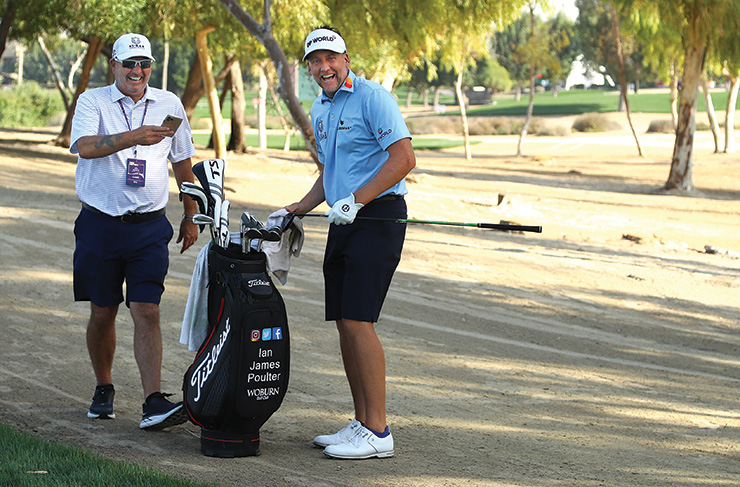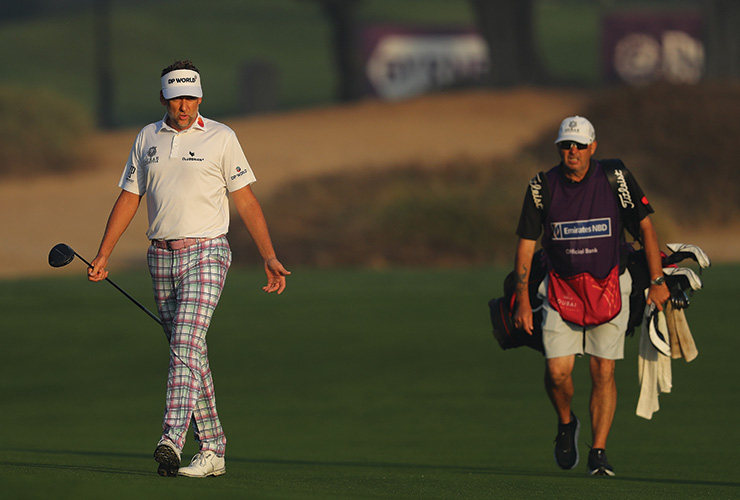Getty Images
Terry Mundy offers a fascinating insight into the highs and lows of looping for European Ryder Cup talisman Ian Poulter
It has been a frustrating couple of weeks, coming from Abu Dhabi we missed the cut there, played okay but didn’t really putt anywhere near as good as we both hoped and then we come here, we do a lot of work on the range and putting, then you get to the first round of the tournament and it doesn’t work out again (four over 76), you don’t get off to the greatest start and it becomes more and more difficult as it goes on. All you can do is to get back to the putting green and the driving range. It is one of those jobs that if things go well it’s pretty easy for the player and the caddie, you go out there, you shoot five-under, you come in, you get some lunch, you go back to the hotel and you come and do it again. But when it isn’t firing on all cylinders it’s hard work on the golf course and then you get in and it’s hard work again because you’ve got to work on putting it right. So this is the side of the job that isn’t so much fun but over a period of time it’s fine, the game doesn’t owe Ian or I anything, we have had our highs in it, it has looked after us well but it’s a little frustrating when it’s not going too well.
RELATED: Caddie Confidential: Helen Storey takes us inside the ropes with Lee Westwood
The technical side of the job is the same every day, you come up with the correct yardage, you call where the wind is, you decide what that yardage is playing and you select a club accordingly, and for the most part that’s not the issue. The issue is when it isn’t working and you’re hitting it right and left, you’re not holing putts, then you have got a frustrated player and then it does become about the personalities and how you talk to each other and how you get through these times. I think it differs from time to time, there are times when a player needs a shoulder to cry on, there are times when he needs a good rev up. I have been with Ian a long time and we are mates so in that respect it’s easier for me because I know him so well that for the most part I know what to say, when to say it and how to deliver it but it’s not always easy because everybody is desperate to do well all the time. So when things don’t go well we would look at everything again and we ask ourselves ‘is this good? What do we need to do? Do we need to sharpen that up? Are we working too hard? Are we not working hard enough? Is it going to help going on the range for three hours or are we just going to get worse?’ It’s a constant battle but in my experience you…if Ian played well, putted it well, popped in a six-under, that could all change for the rest of the year, it is just getting that going again. You don’t want to struggle for too long, you want to get that fixed as quick as you can and turn it around.
It is about personalities, and as a caddie, you wouldn’t perhaps do and say the same things to every player. You don’t caddie one way and you don’t say one thing to all the players. If you have one player who’s chilled and very relaxed he might need a kick, and you might have another one who is so highly strung, he would need the opposite.
So it’s your job as the caddie to decide what needs saying and what needs doing and how to do it and it’s never the same for two players.
RELATED: Caddie Confidential: We go inside the ropes with Andy Sullivan’s looper Tom Ridley

Getty Images
We changed the equipment a little bit and we are trying to recheck that is the right way to go or do we put back in what we know or do we stick with something that’s supposedly going to help long term. [Coach] Pete Cowen is involved in that process, we are just reaffirming stuff. When you have come in and you haven’t had a good score it’s nice to have him there to confirm whether the swing looks good or is there a problem that needs fixing, but yes, Pete said that the swing was pretty good but it becomes about commitment and being aggressive, when you’re not scoring well it’s hard to do that, it’s hard to attack.
You reflect on the things Ian has achieved in the past, such as the Ryder Cup performances, the WGC wins, matchplay wins, sometimes you need to be reminded that it’s not all that bad, you have done this and that, you’re capable, maybe not quite clicking today but we just need to get one good round in the bank and you just keep resetting, trying to go out there and be as positive as you can. We are in a bad position here, I think the cut is going to be level, one under par, we know we need to go out today and shoot five-under and we will do our best (he signed for a 69). At the end of the day there’s no panic button yet, we have had a couple of bad weeks but we will go out today and try to shoot five or six under and if it happens then we will build on that, so it’s just trying to keep pressing to find that one round to spark you off. –With Kent Gray
OMEGA Dubai Desert Classic ‘Daily News’ preview edition
OMEGA Dubai Desert Classic ‘Daily News’ round 1 edition
OMEGA Dubai Desert Classic ‘Daily News’ round 2 edition
OMEGA Dubai Desert Classic ‘Daily News’ round 3 edition
YOU MIGHT ALSO LIKE:
30 things for 30 years at Emirates Golf Club









